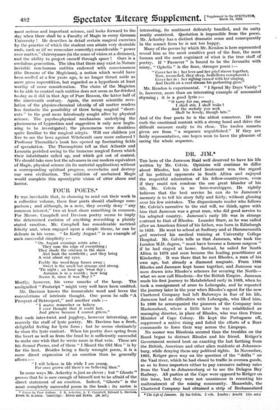FOUR POETS.*
Jr was inevitable that, in choosing to send out their work in a collective volume, these four poets should challenge com- parison ; and although, in a note, they overtly deny " any common interest," two at least share something in common.
For Messrs. Campbell and Davison poetry seems to imply the determined excision of anything resembling a plainly stated emotion. Mr. Campbell has considerable metrical felicity and, when engaged upon a simple theme, he can be delicate in his verse. " In Early August " is an example of such successful simplicity :—
" On August evenings mists arise ;
They ease the edge of everything ; They shade the crimson in the skies And hush the cornfields ; and they bring A mist about my eyes.
Feebly the weed-heap fumes away ;
Sweet is the smell but strange and strong. 'Tis night ; an hour ago 'twas day ;
Autumn is in a month ; how long Seems it, since it was May ? "
Mostly, however, his verse smacks of the lamp. The undignified " Posteript " might very well have been omitted. Mr. Davison knows the immaculate word and loves the convolutions of intricate thought. One poem he calls "A Prospect of Retrospect," and another ends :— " I scarce remember or believe I ever thought that it could last, And grieve because I cannot grieve."
But such inter-twist and jugglery, however interesting, are scarcely the stuff of lyric poetry. Mr. Davison has a fresh, delightful feeling for lyric form ; but he seems obstinately
to shun the lyric content. When his poetry does spring from the heart as well as from the head he is sufficiently successful to make one wish that he wrote more in that vein. These are his Second Poems, and of them " I Heard the Old Men " is by far the best. Besides being a finely wrought poem, it is a
more direct expression of an emotion than he generally allows :- " I will believe in life while I am young,
For once grown old there's no believing then."
In some ways Mr. Ackerley is just as clever ; but " Ghosts " proves that he is sure enough of himself not to be afraid of the direct statement of an emotion. Indeed, " Ghosts " is the most completely successful poem in the book : its metre is
• Poems by Four Autkors. J. R. Ackerley, A. Y. Campbell, Edward L. Davison. Fmk u. Ji.,ndou. Cambridge : Bowes and Bowes. Ns. net.)
interesting, its sentiment delicately handled, and its unity neatly contrived. Quotation is impossible from the poem. Mr. Ackerley has a distinct dramatic sense and consequently in the sonnet form he is not too happy.
Many of the poems by which Mr. Kendon is here represented reveal him as the most sensitive poet of the four, the most human and the most cognizant of what is the true stuff of poetry. If " Passover " is bound to be the favourite with many, " Ophelia " is the finer, stronger poem :-
"Cover her in : her love and her grief strove together, Now, reconciled, they sleep, bedfellows complacent : Cover her in : her sighing ceased with her singing, And Death on a cool stream his garlanding gave."
Mr. Kendon is experimental. " I Spend My Days Vainly " is, however, more than an interesting example of assonants.'
rhyming ; it is a good lyric :—
" 0 tarry for me, sweet ;,
I shall stir, I shall wake ! And the melody you seek Shall be lovely, though late."
And of the four poets he is the ablest sonneteer. He can curb the emotional content with a strong hand and drive the difficult measure easily to its close. The twelve sonnets given are from " a sequence unpublished." If they are fairly representative, one hopes soon to have the pleasure of seeing the whole sequence.


































































 Previous page
Previous page